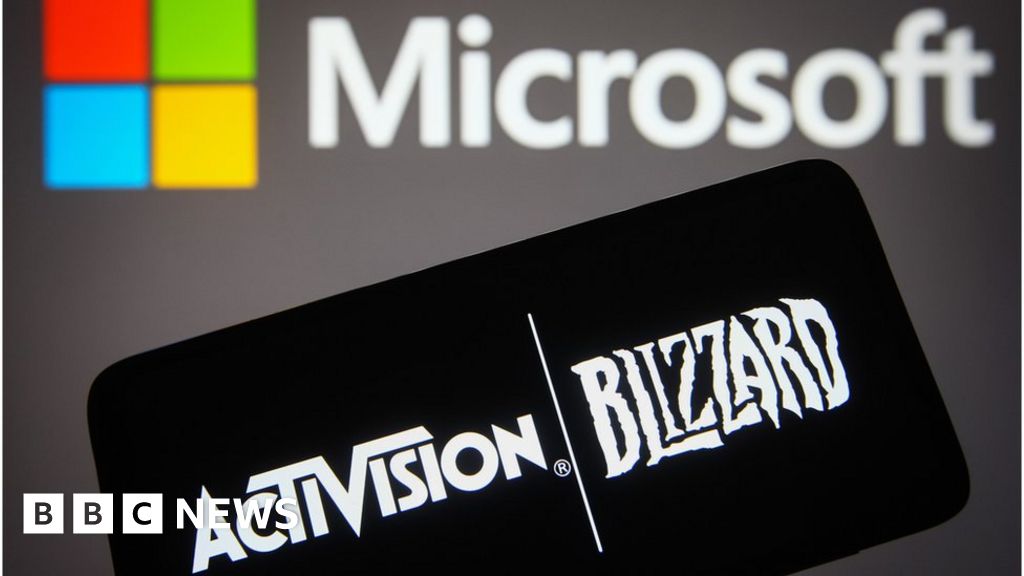- By Steffan Powell
- Gaming correspondent
Image source, Getty Images
EU regulators have approved Microsoft’s $69bn (£55bn) attempt to purchase Call of Duty publisher Activision Blizzard.
The European Commission (EC) said Microsoft had addressed their concerns on competition issues.
It comes three weeks after the UK blocked the deal over worries it would hurt competition in the emerging cloud gaming business.
The proposed takeover is poised to be the biggest deal in gaming history but has split global regulators.
In order for the deal to go through Microsoft and Activision need approval from regulatory bodies in the UK, EU and the US.
The US Federal Trace Commission filed a lawsuit in December to block the deal – a judge’s decision is unlikely before the end of the year.
The EC have approved the acquisition, saying that Microsoft’s offer of 10 year free licensing deals – which promise European consumers and cloud game streaming services access to Activision’s PC and console games – mean there would be fair competition in the market.
“The commitments fully address the competition concerns identified by the Commission and represent a significant improvement for cloud gaming as compared to the current situation,” the EU competition watchdog said in a statement.
It said an in-depth market investigation indicated that Microsoft “would not be able to harm rival consoles and rival multi-game subscription services”.
And it said cloud game streaming service providers “gave positive feedback and showed interest in the licences”, with some having already entered into agreements with Microsoft based on their proposals.
Significant hurdles
Reacting to the European Commission’s statement, CMA chief executive Sarah Cardell said they stood by their decision.
“Microsoft’s proposals, accepted by the European Commission today, would allow Microsoft to set the terms and conditions for this market for the next 10 years,” she added.
“They would replace a free, open and competitive market with one subject to ongoing regulation of the games Microsoft sells, the platforms to which it sells them, and the conditions of sale.
“This is one of the reasons the CMA’s independent panel group rejected Microsoft’s proposals and prevented this deal.”
Cloud gaming – is it the future?
The deal is important for Microsoft who are trying to play catch-up with its main competitors Sony. They have been the more successful of the two in recent years when it comes to sales in the console market.
However, this attempted massive investment from Microsoft can been seen as a play for the future of games rather than its present. Microsoft is betting big on its Game Pass service, which can be described as a Netflix of games.
They think the future lies in players having subscriptions to libraries rather than making one off purchases – which is the predominant way of accessing games at the moment.
Their Game Pass offering is compelling but lacking the volume and calibre of new titles to fully transform the way most people play. This deal would give it control of some of the world’s most popular games such as Call of Duty, World of Warcraft and Overwatch. Being in charge of titles like that could be a big boost to the service.
Cloud gaming is an extension of that principle allowing people to stream their game on any device they own – form a phone to a console or high-end PC. Just like watching Amazon Prime or Disney+ but with video games.
Currently this is a small and emerging part of the games industry because of the technological requirements of making it work. It is however seemingly growing with the number of people playing this way in the UK having tripled between 2021 and 2022 according to the CMA.
Microsoft have invested in this space and so combined with its Game Pass offering it is in a good position to lead the way, should cloud gaming go on to become a significant part of the industry.
That is why the CMA decided to block the decision in the UK, arguing it would put Microsoft in too dominant a position in this up-and-coming sector.
Post-Brexit friction?
“It does more than shake our confidence in the future of the opportunity to grow a technology business in Britain than we’ve ever confronted before,” he said in an interview with the BBC last month.
“There’s a clear message here – the European Union is a more attractive place to start a business than the United Kingdom.”
The drama is far from over and there is a lot of money on the line. Activision Blizzard, for example, will still get $3bn from Microsoft if the deal fails.
The EU taking an opposing position on the mega-deal could be read by some as a reflection of post-Brexit frictions with the UK.
It is believed that Microsoft’s recent 10-year licensing agreements with cloud streaming rivals Nvidia’s GeForce Now, Ukraine’s Boosteroid and Japan’s Ubitus, played a role in the EC decision.
Nintendo and Sony are also being promised access to keep Call of Duty on their gaming consoles – the Switch and PlayStation. This non-exclusivity for the Activision Blizzard game has helped smoothed the path.

